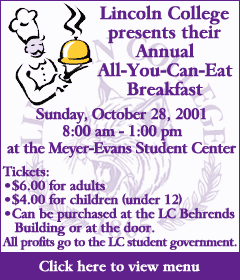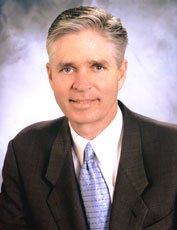|
Two-step
plan suggested
for sewer rate increase
[OCT.
10, 2001] The
sewer rate increase that Lincoln needs in order to get a loan to
upgrade its wastewater plant could be put in place in two steps,
according to Joseph Miller, general manager of the Environmental
Management Corporation, which operates Lincoln’s sewer facility.
|
|
Miller
spoke to the City Council Tuesday evening, reminding them again that
unless they move quickly to approve the increase, they will not be
eligible to get funding for the project in January.
The
upgrade is necessary, officials say, because the existing plant has
reached capacity, and violations would mean the Illinois
Environmental Protection Agency could refuse to approve any new
sewer hookups, thus stopping growth in the city.
To
emphasize how much the upgrade is needed, Grant Eaton, sewer plant
manager, said the plant had its first ammonia violation last week.
"If
we had a new plant, I would have been able to handle that extra load
(of ammonia)," he said. "Now we have a violation on the
books, and we are on a tightrope to make sure we don’t violate
again."
However,
he said, the IEPA said the Lincoln plant "responded well"
to the ammonia overload.

The
rate increase is the same as the one presented to the council in
September except that is in two tiers, Miller said. The interim
increase would go into effect in January of 2002, and the
"worst case scenario" final increase would become
effective 18 months later.
This
would allow users a little more time to prepare for the rate
increases, he said, and if the city did get additional funding,
might lower the worst-case projected increases.
The
"worst case scenario" means that the city has no other
sources of funding and must foot the entire $9.8 million bill for
the sewer upgrade. However, Eaton said he is still trying to get a
$400,000 state grant and he is also hoping for funding help through
an Illinois FIRST grant. He urged council members and citizens to
contact state officials to push for an Illinois FIRST grant.
Under
the two-step plan, rates for Lincoln residents would be raised from
$11 monthly to $14 monthly for the first step and then to $16.39
monthly under the worst-case scenario 18 months later.

Residential
rates for those living outside the city limits would go from $12 to
$17.52 a month, then up to $22.31.
Rates
for commercial, industrial and institutional users would also rise,
under a complicated formula which lowers the fixed monthly charge
but increases fees for actual use.
For
example, fixed rates for commercial users inside the city limits
would drop from $5.45 to a final or a worst-case $2.22 per month,
but the volume charge would increase from $0.86 per 100 cubic feet
to a final $1.55 per cubic foot. Surcharges would also go up, from
$.13 per pound for BOD (biochemical oxygen demand) to a final $.51
per pound, and the present $.12 per pound TSS (total suspended
solids) to a final $.30 per pound. Commercial users outside the city
limits would pay even higher rates.

[to top of second column in
this article]
|

Charges
for industrial and institutional users such as the Lincoln and Logan
Correctional Centers would also rise according to volume and to BOD
and TSS readings.
According
to a chart presented to the council in September which gave examples
of increases in the various categories, fees for Logan Correctional
Center, an institutional user, would rise from $11,550.37 per month
to a final $26,772.74. Fees for Eaton Corporation/Cutler Hammer, an
industrial user, would rise from $3,060.25 to $6,955.09 monthly, and
fees for McDonald’s, a commercial user, would go from $123.90 to
$216.21 per month.
The
substantial fee increases are necessary, Alderman Bill Melton
pointed out, because the city didn’t raise rates regularly as time
went along.
Eaton
said there was a slight increase in rates four years ago because of
the west-side sewer project, but before that there had been no raise
for about 12 years.
The
rate increase ordinance will be on the agenda at the next regular
council meeting on Oct. 15.

City
won’t pursue purchasing
water company
The
council also decided not to pursue any plan to purchase the Illinois
American Water Company, which is being sold to a German firm.
Bill
Bates, the city attorney, said a 1970 agreement gives the city the
right of first refusal in case the company is sold. However,
Illinois American has informed the city they believe the city waived
that right back in the early ’70s when Commonwealth Edison sold
the company.
Bates
said that to try to pursue the city’s right to buy the company, he
would have to lodge a complaint with the Illinois Commerce
Commission and attend hearings in Springfield, which would be an
extra cost to the city. Alderman Michael Montcalm said that
regardless of the amount it would cost to find out if the city does
have a right to purchase the water franchise, the city doesn’t
have the money to buy it.
The consensus of the
council was not to pursue the matter any further.
[Joan
Crabb]

|
|
Tell
a friend about
Lincoln Daily
News.com |
Our
staff offers more than 25 years of experience in the
automotive industry.
Greyhound
Lube At
the corner of Woodlawn and Business 55 No
Appointments Necessary |
Advertise
your
Garage
Sale in Lincolndailynews.com
--
It's FREE! --
Click
here |
|
|
|
|
Clinton
nuclear power plant
safety measures in place
[OCT.
10, 2001] Rep.
Jonathan Wright, R-Hartsburg, and Sen. Claude Stone, R-Morton, met
today with officials from Exelon Generation and AmerGen regarding
the Clinton nuclear power plant. Rep. Wright and Sen. Stone were
assured that the nuclear power facility is taking appropriate
security measures in response to the Sept. 11 terrorist attacks.
|
|
"Obviously,
the facility will not and should not disclose all the specific
details regarding security measures at the facility," Wright
said. "But Senator Stone and I were given adequate information
to indicate that measures are in place to safeguard the
facility."
All
nuclear power plants are heavily regulated as to all aspects of the
facility — including safety. Even before Sept. 11, these types of
facilities have had significant security measures in place. The
Clinton plant is simply adding to those measures.
[News release]
|

|
|
|
Understanding
Muslims
Authority
on Islam speaks at local forum
[OCT.
9, 2001] Monday
evening, Oct. 8, in the chapel on campus, Lincoln Christian College
and Seminary hosted a forum on Islam. The forum presentation by Dr.
Robert Douglas was entitled "Islam, Muslims, and America: A
Christian Missionary’s Perspective." Douglas is the professor
of intercultural studies at Lincoln Christian Seminary and an
internationally recognized authority on Islam.
|
|
Dr.
Keith Ray, president of the college and seminary, welcomed the
audience and gave a brief introduction of the speaker and topic.
Speaking for the school, he said, "It is our hope that through
this conversation that Dr. Douglas will be able to inform you about
the basic tenants of [the Islamic] religion, some aspects of that
world view and bring you to a greater understanding about what is
happening in our world." It was his wish that the forum would
do three things in the audience’s lives: "To help you think
more clearly about the world in which we live … [To help] all of
us to engage a greater zeal for the truth of God … That you would
sense in your own lives a greater calling in the affairs of God’s
mission on this earth."
The
outline of the evening was simple. After the introduction, Douglas
gave a short speech introducing the audience to the religion of
Islam and the varying beliefs among Muslims. Then there was about an
hour of question and answer, followed by a closing prayer by the
LCCS president.
Douglas
began his speech by breaking through some misconceptions and
prejudices held by many Americans. He said that in many people’s
minds, all Arabs are Muslims and all Muslims are Arabs. This,
however, is incorrect. He said that one-fifth of the world’s
people are Muslims, and that this one-fifth is comprised of over 700
different ethnic and language groups. In fact, only one-fifth of all
Muslims are Arabic.

But
even beyond that, he said, many people think that not only do people
believe that Muslim=Arab, but they believe that
Muslim=Arab=Terrorist. He cited the television show "West
Wing" in comparing this equation to Christian=White=Ku Klux
Klan, a shockingly effective analogy.
From
there, he explained how there are great differences, not only in the
ethnic background of Muslims, but in the beliefs and practices. The
spectrum ranges from orthodox or fundamental to progressive, and
even within each label there are wide differences. His main point,
which was driven home by the end of his speech, was that we, as
people and as a nation, cannot allow ourselves to fall into bigotry
or prejudice. Not every Muslim believes that Islam condones acts
such as the ones committed on Sept. 11.
[to top of second column in
this article]
|

After
this, the floor was opened for questions. Eleven questions were
posed by various people, from LDN’s own photographer Bob Frank to
Pastor Mark Carnahan of Zion Lutheran Church. Some of these
questions and answers are below.
Is
there anything in the Qur’an that would support the terrorists’
actions?
Douglas
answered, "From the terrorists’ perspective, yes." He
then went on to explain the term Jihad, which essentially means
"struggle." There are two forms, "Greater Jihad"
and "Lesser Jihad." Greater Jihad is both the striving
within yourself to be what God wants you to be and the struggle in
action and speech to spread Islam. Lesser Jihad is striving in terms
of warfare.
Is
there an order in the Qur’an to kill all Christians?
Again,
Douglas answered that some would say yes. He cited some verses in
the Qur’an that say not to befriend a Jew or Christian, or say
that Muslims must "fight against polytheists and destroy
them." According to the Muslim view of polytheism, which is
that you associate any "partner" with God, Christians are
polytheistic, because of the belief of Jesus as God’s son.
Is
there a reward, such as immediately going to paradise, for dying in
the Jihad the way the terrorists did?
Douglas
said that the reason the terrorists did what they did was because
they were people "who believed that they were doing the will of
God." The specific will of God was that they were attacking the
nation that they saw to be corrupting the world and keeping society
from being how God wants it.
Where
did the Qur’an come from and what is the Muslim view of the Bible?
The
Qur’an was compiled of the speeches given to Mohammed by God. It
is the unquestionable truth to the Muslims. The Bible is true only
"to the extent that the Bible and the Qur’an match."
Do
Muslims know that they are saved the way Christians do when they’re
born again?
"No."
Douglas quoted a Muslim acquaintance as saying, "You cannot
know until the time. We cannot know how God will judge." God
could always change his mind.
[Gina
Sennett]

|
|
|
America
strikes back
As
promised, the United States led an attack on Afghanistan. The attack
began Sunday, Oct. 8. American and British military forces made 30 hits on
air defenses, military airfields and terrorist training camps,
destroying aircraft and radar systems. The strike was made targeting
only terrorists.
|
|
More
than 40 countries in Africa, Asia, Europe and the Middle East have
pledged their cooperation and support the U.S. initiative.
Online
news links
Afghanistan
http://www.afghandaily.com/
http://www.afghannews.net/
http://www.afghan-web.com/aop/
China
http://english.peopledaily.com.cn/
http://www1.chinadaily.com.cn/
Germany
http://www.faz.com/
India
http://www.dailypioneer.com/
http://www.hindustantimes.com/
http://www.timesofindia.com/
Israel
http://www.jpost.com/
http://www.haaretzdaily.com/
London
http://www.thetimes.co.uk/
http://www.guardian.co.uk/
http://www.telegraph.co.uk/
http://www.thisislondon.co.uk/
Pakistan
http://www.dawn.com/
http://frontierpost.com.pk/
Russia
http://english.pravda.ru/
http://www.sptimesrussia.com/
Saudi Arabia
http://www.arabnews.com/
[to top of second column in
this section]
|

Illinois
http://www.suntimes.com/index/
http://www.chicagotribune.com/
http://www.pantagraph.com/
http://www.qconline.com/
http://www.pjstar.com/
http://www.sj-r.com/
http://www.herald-review.com/
http://www.southernillinoisan.com/
New
York
http://www.nypost.com/
http://www.nytimes.com/
Stars
and Stripes
(serving the U.S.
military community)
http://www.estripes.com/
Washington,
D.C.
http://www.whitehouse.gov/
http://www.washingtonpost.com/
http://www.washtimes.com/
Others
http://www.thepaperboy.com/
|
|
Tell
a friend about
Lincoln Daily
News.com |
Our
staff offers more than 25 years of experience in the
automotive industry.
Greyhound
Lube At
the corner of Woodlawn and Business 55 No
Appointments Necessary |
Advertise
your
Garage
Sale in Lincolndailynews.com
--
It's FREE! --
Click
here |
|
|
|
Recalling
the ashes of New York
A
Lincoln family views the terror
[OCT.
8, 2001] Pastor
Mark Carnahan is the minister of Zion Lutheran Church in Lincoln.
Preston Carnahan, his son, has been the subject of previous
LDN news articles and is now attending the United States
Merchant Marine Academy, located in Long Island, N.Y. Pastor
Carnahan and his wife, Maggy, visited Preston for the annual Parents
Weekend at the academy. They arrived on Thursday, Sept. 6, five days
before the attack.
|
|
"We
looked the part of the tourists," said Carnahan, smiling at his
wife sitting next to him in a sizable church office offset to his
own. The room itself was lit somewhat low, giving it a sullen
atmosphere at almost 8 o’clock at night, which would not only set
the tone for the conversation, but also match it, in regard to the
difficult subject matter.
"On
Saturday, Sept. 8, we took the subway into the basement of the Trade
Center," he said, also noting the many men and women they rode
alongside of that day and on Monday who undoubtedly worked there —
none of them the wiser as to what was on its way.
"You
just took it for granted," Maggy began, in describing the twin
towers before the tragic fall. "Just these beautiful, fantastic
buildings that dwarfed the city. They were just so imposing, and yet
you just took for granted that they were even there."
The
Carnahans had visited New York on previous occasions and describe
the misconception most have toward the city as humorous. "I
love New York," Maggy continued. "The people there are so
friendly, I always look forward to going." Surprisingly her
attitude remains so optimistic, considering the events of this past
trip.
Ready
to return home after a successful visit, Carnahan recalls Tuesday
morning, Sept. 11, in LaGuardia Airport:

"I
was waiting in line to check my luggage before boarding (on American
Airlines), when an employee came out and said there weren’t going
to be any more flights that day," Carnahan began. "I
looked at the airline employee, looked outside, then back at him and
said, ‘Looks like a nice day to fly to me.’"
Eventually
everyone in the airport was told to vacate the premises. "They
told us we had to go," he continued. "I looked around and
said, ‘Go where?’ And then he just told us, "Go!"
Once
outside, the Carnahans and all the other airport evacuees began to
grasp the severity of the situation, as they gathered to watch a
massive fire in the sky.
Hearts
pounding and fears rising with the smoke, Maggy recalls that leaden
moment when she realized and said, "Wait a minute... One of the
towers is gone."
Pastor
Carnahan explained how another employee then came outside shouting,
"You need to go! Everybody! The FBI is evacuating the area,
everybody needs to go!"
Perhaps
more shocked than confused, Carnahan asked yet again, "Go
where?" There they were met with an answer of the inevitable...
"Just go!"
With
that, Pastor Carnahan, his wife and all other would-be travelers of
the air became wanderers on foot. With literally nowhere to go but
the interstate and no sight to focus on but a "giant in
flames," they began walking. "We were like refugees,"
said Carnahan. "For awhile, that’s what we were."

Maggy
noted how amazingly calm everybody seemed to be. As they walked, a
small rental van pulled alongside, which they were the first to
board. They described the van ride as quiet, nobody really saying
anything, just watching. Watching as a city before them was falling
apart and as the lone tower left standing was beginning to fall.
The
van pulled over. Quiet. No words. Jaws and hearts alike instantly
dropped. Carnahan and his wife looked out over the city toward the
giant cloud pounding out of the crumbling shrine.
"Thirty
seconds to a minute passed after it fell before anyone made a
sound," said Carnahan quietly.
Then
the driver, a native New Yorker, stood by the door and asked aloud
the very thing that each and every one who witnessed it was
thinking: "Did I just see what I thought I saw?"

[to top of second column in this
article]
|

Delayed
a few days in the city
"I
paddled until I was paddled out," Carnahan said reflectively,
recalling his need to clear his mind later that night. Out in the
water, kayaking with God, he tried not to think about the terror. He
tried not to think about what he was forced to see that day, or
what, within the course of retaliation, he may be forced to see in
the coming months. He tried not to think about the cots he and his
wife had slept on just a few nights before, for an event as innocent
as Parents Weekend, that were now being shipped across the harbor,
being used to hold dead bodies as part of a makeshift morgue, if
need be.
Sitting
back home
Safe
here in the office, recalling those moments and the days that
followed, Carnahan tried not to think and he tried not to cry.
He
battled a new set of tears while relaying the trip home, where they
encountered an all-but-abandoned truck stop in Pennsylvania.
Abandoned because of the owner’s skin color… brown. Sadly he
recalled how they witnessed the truck stop owner being harassed.
Rubbing
the sleeping head of his young son on his wife’s lap steadied his
emotions as he continued, explaining his family’s rocky mental
state. "I just zone out. It’s like slow motion. I’ll be
driving, and it’s like I’m in another zone, like I’m not a
part of normal things," says Carnahan.
"I
don’t think I’ve ever had nightmares before," added Maggy,
adjusting her son, "but I’m having them now."
Arriving
safely back in Lincoln — by car, not plane — the Carnahans say
they are struck with a deep sense of guilt for leaving that world
behind, for returning to normalcy while others maintain the horror.

Though
while still there they stood in line to give blood and stood aside
the city to pray, back here they fight to scatter the ashes of
terror — the pictures their minds have brought back with them.
Fighting, however, with undoubtedly the best weapon Carnahan knows
to arm himself with: a resounding faith. "God is in
control," the pastor said firmly. "God is good, and He is
in control. I just trust God. He is the only answer for my
fears."
It’s
a faith that will serve the Carnahan family well as they continue to
seek out a life as they knew it, a life that may not return, given
Carnahans’ stolid summary about this ordeal and each vivid memory
therein: "It’s not a matter of reliving it... because we’re
still living in it."
The
Carnahans have a daughter and son-in-law stationed in Hawaii. As of
now they are uncertain where they will be assigned or what that
assignment will be. They are parents to a young toddler girl. ...
Her power of attorney papers are currently en route to Lincoln.
[Colin
Bird]

|
|
|
Fire
Prevention Week: Oct. 7-13
[OCT.
6, 2001] In
2000, there were 9,911 residential fires, and over 100 people died
as a result. Fire Prevention Week is Oct. 7-13, and your state
senator wants you to know how to protect your family, yourself and
your property from being part of this statistic. "Knowledge is
key when preventing fires and the fatalities that can result from
them," says Sen. Claude Stone, R-Morton.
|
|
The
following is a list of steps that will help to keep everyone out of
harm’s way:
•
Install and maintain smoke detectors.
•
Sleep with bedroom doors closed. Closed doors provide protection
against heat and smoke.
•
Know your exits. Choose the safest escape route, but if you must go
through smoke to escape, crawl low, where the air is cleaner and
cooler. Regularly practice your escape route with your family.
•
Before opening a closed exit door, feel the door and frame around it
for any signs of heat.
•
If you are trapped, close the doors between you and the fire. Stuff
the cracks around the door to keep smoke out. Wait at a window and
signal for help.
•
Stop, drop and roll. If your clothes catch fire, don’t run!
•
Once you’re out, stay out! Do not go back into your home for any
reason until it’s safe.
[to top of second column in this
article]
|
For
more information on fire safety, go to the Illinois Senate
Republicans’ website, www.senategop.state.il.us,
and look under consumer information.
Communities
can also receive state assistance in the area of fire prevention. To
date, Illinois FIRST has funded 790 grants for fire protection
buildings, vehicles and equipment. Sen. Stone and all of the
Republican senators of Illinois continue to work on grants for
communities in their districts to assist fire departments through
the Illinois FIRST program.
[News release]
|
|
|
Gov.
Ryan announces School-Home Links in reading for 170 Illinois
schools
[OCT.
6, 2001] Gov.
George Ryan announced that kindergarten through third-grade teachers
from 170 schools across the state have just received a new tool to
help their students excel in reading. Created in cooperation with
Gov. Ryan's Advisory Council on Literacy and Illinois Reads,
School-Home Links are activities that teachers ask families to use
with their children at home to reinforce reading concepts taught in
the classroom.
|
|
"With
School-Home Links, we can be sure that what is taught in the
classroom is being reinforced at home," Gov. Ryan said.
"These activities will help children make learning a part of
their lives, both in and outside of the classroom."
Each
School-Home Link helps children practice skills that will better
enable them to meet Illinois state learning standards in language
arts. The links were originally developed by two elementary school
faculties and then refined by the U.S. Department of Education in
cooperation with the Boston Annenberg Challenge.
Teachers
can assign the grade-appropriate School-Home Link as often as three
times a week. Both parents and children are asked to work together
to complete the different reading activities, which will be kept by
the teacher in the student's portfolio.
The
School-Home Links were aligned with the Illinois state standards by Illinois
Family Education Center and the Illinois
State Board of Education. The Lincoln-based Illinois Family
Education center field-tested the links in 32 East St. Louis schools
during the 1999-2000 school year.
"The
School-Home Links provide regular communication between teachers and
parents about what a child is learning, prompt parent-child
interaction at home, and extend learning time to build children’s
reading skills," said IFEC Executive Director Sam Redding.
[to top of second column in this
article]
|
The
School-Home Links represent an integral part of Gov. Ryan's
commitment to promoting literacy. He recently created the Summer
Bridges program, which provides an extended learning experience to
children who are at risk of academic failure and encourages them to
improve their reading skills. In 2000, 75 school districts reported
that at least 60 percent of students who participated in the Summer
Bridges program demonstrated an improvement in their reading
ability.
In
1999 Gov. Ryan formed an Advisory Council on Literacy, which
consists of 20 members representing diverse interests. The advisory
council and the state’s literacy office aim to increase the number
of literate adults and help all children read well by the end of
third grade.
Last
year, Gov. Ryan launched the Illinois Reads initiative to coordinate
and improve literacy policies and programs. Illinois Reads maintains
a website (www.illinoisreads.org)
that is a clearinghouse of reading and literacy resources in
Illinois.
[News release]
|
|
|
Part
2
Logan County ready for
action if terrorist event occurs
[OCT.
5, 2001] Even
though the public may not have been aware of it, agencies all over
the United States, including those in Logan County, were preparing
for terrorist attacks well before the destruction of New York’s
World Trade Center, and they are ready to take action if an event
occurs.
|
|
[Click
here for Part 1]
The
approach to chemical terrorism is somewhat different from the
approach to biological terrorism, Terry Storer explained.
"Typically, chemical terrorism is an acute, fast-acting event,
with people getting sick or injured quickly. Biological terrorism is
of longer duration. We might not know about it until the population
reported symptoms."
Although
many people worry about chemical and biological attacks on the
nation’s water system, Gary Bellafiore, operations supervisor at
the Illinois American Water Company of Lincoln, says such attacks
would not create nearly as much damage as people believe.
"Water
companies have a lot of safeguards," he said at a recent
meeting of the Logan County Local Emergency Planning Committee, an
agency that works hand in hand with ESDA. "Pesticides,
herbicides, metals, bacteria —
we look for these all the time. The
water industry has been fighting this battle for 100 years. We
monitor a host of chemicals on a routine basis.
"If
anything foreign enters the water supply, we will notice a change
immediately. Chemists are monitoring the water on a constant basis,
at least every four hours around the clock, and that monitoring has
been enhanced since the terrorist strike on the World Trade Center.
"It
would be very difficult for an enemy to put enough biological or
chemical agent in a water supply that the present treatment can’t
take care of. We would catch it before there were many fatalities.
To put in a sufficient amount of an agent to kill a large
population, the enemy would have to back a truck up to the system
and pump it in," Bellafiore said.
"The
Environmental Protection Agency has a lot of standards for drinking
water in this country that make it extremely safe from biological or
chemical terrorism," he added. "A lot of government
regulations and monitoring is required. Our water supply is safer
than people think."
Debby
Cook, director of nursing at the Logan County Health Department,
agrees with Bellafiore that biological agents are not as easy to
dispense as some people believe. Also, like ESDA, the Health
Department has done a lot of work to prepare for a biological
terrorism event.
"We
have been looking at this issue for a long time —
two to three years," she said.
Like
the local fire and police departments, the Health Department already
has systems in place that can be used to combat a terrorist event.
"We
deal with biological events every day at the Health Department —
chickenpox, strep throat, other communicable
diseases. Although the agents we are talking about in the event of
an attack are not the common things we deal with, the same systems
will be utilized that are in existence now."
The
Health Department also has quick access to help from state and even
federal agencies, if necessary.
"One
call to the Illinois Department of Public Health will activate the
proper personnel," Cook said. "When we say we need help,
they will give us access to the appropriate agency. They will even
send people to consult with us, if necessary."
She
pointed out that most biological events would be covert and that it
would probably take some time for symptoms to develop.
[to top of second
column in this section]
|
What
Cook and the Health Department would like to see is a more efficient
reporting system in place so the department can get immediate access
to all available information.
She is
starting to work on a system where schools, employers and others
would report spikes of unusual illnesses to a central source.
"Only if someone looks at all the information available can we
figure out what’s going on. Also, it would be helpful to have a
communication site, such as a website, to tell people what the facts
are and what they should do.
"My
true fear is that we are going to have more problems with panic or
false information than with anything else," she said.
Barb
Kline, director of public relations and risk management at Abraham
Lincoln Memorial Hospital, says the hospital, too, has systems in
place to take effect in the event of a biological terrorism
incident.
"We
have a response plan for citizens of Logan County that has two
links," she said. "First we have an emergency response to
ESDA and LEPC. They are linked to state agencies such as Illinois
Emergency Management Agency. Depending on the type of event and the
resources needed, our local agencies have access to outside
resources.
"Second,
on the medical front, we will be in touch with the Illinois
Department of Public Health, which in turn is linked to federal
health agencies such as the Center for Disease Control in Atlanta.
There are systems set up nationwide."
These
health agencies, she said, could within a matter of hours send
medical personnel and medical supplies from stockpiles already in
place in a number of locations to respond to a local crisis.
"These
things have been thought of and discussed. We are not just going to
put a plan together after an attack," Kline said.
Kline
is a member of a subgroup of the Logan County LEPC that has recently
been evaluating how the county’s position in central Illinois, 30
miles from the state capital, might make it vulnerable to attack, as
well as how an event that occurs here might affect other places in
the state.
"In
recent months our specific subgroup of people from the Health
Department, paramedics and those trained to respond to hazardous
materials incidents have been evaluating where we are vulnerable,
what plans are in place and what we need to do to improve our
preparedness.
"We
are learning about bio-terrorism, the resources available to us and
especially how terrorists, people who have no regard for life, can
think," she said. "We want to be sure we are
prepared."
The
attack on the World Trade Center was a shock, but not a surprise, to
the world of emergency management personnel, Fulscher said.
"We
are still horrified that it happened, but we knew it was coming some
day. We have been more aware of the threat than the average man on
the street.
"But now, the average
citizen is just as aware as we in the emergency services are of the
possibility of terrorism. That’s why people say America is forever
changed."
[Joan
Crabb]
|
|
|
Rep.
Wright works to keep LDC open
[OCT.
4, 2001] The
Federal Department of Public Health has conducted an inspection that
has found violations at the Lincoln Developmental Center in Lincoln
that could lead to the facility’s decertification, taking away
crucial federal funds. State Rep. Jonathan Wright said he’s
committed to keeping the center open and operating.
|
|
The
state has initiated the decertification process based upon alleged
violations cited by the Department of Public Health. Rep. Wright,
R-Hartsburg, says he is taking steps to work with the Illinois
Department of Human Services to address all concerns, in order to
keep Lincoln Developmental Center operating for years to come.
"Lincoln
Developmental Center is a wonderful asset to the city of Lincoln and
the surrounding area. It offers much needed services to people with
developmental disabilities, while also providing quality employment
opportunities," said Wright.
Rep.
Wright has been in continued contact with key individuals within the
Department of Human Services and within the office of Gov. George
Ryan. "I am committed to exhausting all efforts to ensure that
Lincoln Developmental Center remains a thriving facility for people
with developmental disabilities," Wright said.
[to top of second column in
this article]
|
In
addition to the employment opportunities brought to the community by
Lincoln Developmental Center, the facility provides excellent care
for those people with developmental disabilities who are not able to
function in a more informal setting, such as a residential care
facility.
"I
continue to receive many telephone calls from parents of residents
at Lincoln Developmental Center concerned about the decertification
process and how that will impact their child," Wright said.
"The parents are committed to keeping the facility open based
upon the excellent care their children have received over the
years."
[News release]
|
|
|
LDC
in danger of losing certification
[OCT.
4, 2001] Federal
inspection of the Lincoln Developmental Center has put the facility
in jeopardy of losing its certification.
|
|
Sen.
Duane Noland, R-Blue Mound, and Rep. Bill Mitchell, R-Forsyth,
recently learned that the Lincoln Developmental Center is in danger
of losing its federal certification. While minor, there were enough
violations, mostly revolving around staffing and patient care
programs, to bring the facility under closer inspection. It is
believed that the problems began at the administrative level and
filtered down.
"Lincoln
Developmental Center is a facility with over 700 employees and over
370 residents. The center has a huge economic impact on central
Illinois. In addition, the facility houses friends and family
members of residents of central Illinois. The continual operation of
this facility is a matter of great concern to me," said Sen.
Noland. The center provides a vitally important service to the most
vulnerable in our society.
[to top of second column in
this article]
|
Several
upper-level administrative positions have recently been changed in
an attempt to enact new procedures and correct the weak areas of
service. Peggy Davidsmeyer has been named the new director,
replacing Gwendolyn Thornton. Davidsmeyer brings strengths of experience
in the field as an assistant director at Jacksonville Developmental
Center for seven years. She has worked with developmentally disabled
people for 30 years.
"The
Lincoln facility provides much needed services to the people of
Illinois. It is a priority to keep it open and operating at full
staffing levels," said Rep. Bill Mitchell
Noland
and Mitchell are requesting a meeting with Secretary Baker and
personnel from the Department of Public Health and the Department of
Public Aid to brief them on the status of the Lincoln Developmental
Center and the available corrective measures to keep the center
open.
[LDN
and news release]
|
|
|
Part
1
Logan County ready for
action if terrorist event occurs
[OCT.
4, 2001] Even
though the public may not have been aware of it, agencies all over
the United States, including those in Logan County, were preparing
for terrorist attacks well before the destruction of New York’s
World Trade Center, and they are ready to take action if an event
occurs.
|
|
"Logan
County has been working on this," said Dan Fulscher, director
of the Emergency Services and Disaster Agency for the county.
"We recognized, and the state of Illinois recognized, that an
attack was likely.
"We
have been preparing very solidly for a year, with a task force that
was formed in Logan County. Two weeks before the New York tragedy we
had already made a request to the state of Illinois for specific
equipment that would allow us to protect the citizens of Logan
County better if there was a real terrorist event."
The
six-year plan, which was submitted at the end of August, would
provide more training and equipment for local agencies, including
suits to protect fire and police personnel against chemical and
biological agents, chemical detection kits, gas monitors, thermal
imaging cameras, and decontamination equipment such as giant scrub
brushes, cleaners and soaps to neutralize the chemicals.
The
request also includes better equipment for the Logan County Health
Department and for other government entities that could be involved
in a terrorist attack, such as highway department personnel and
emergency room workers, Fulscher said.
Terry
Storer, assistant director of ESDA, said that area fire and police
departments are well trained to respond to emergencies such as
chemical leaks or spills, and that training would allow them to
respond to a terrorist incident as well.
[to top of second
column in this section]
|
"For
us, it would be business as usual," Storer said. "If we
had a terrorist attack using chemical or biological agents, it would
be handled in much the same way that we would handle an industrial
leak or spill.
"Emergency
responders, members of the Fire Department, would be sent to the
area of the attack. They would immediately treat any injuries and
then would identify the chemical and make an action plan.
"Members
of the Fire Department have been trained to identify chemicals and
know what to do," he added. Also, they could get help from
other agencies.
"The
Health and Human Services Department has Metropolitan Medical
Response Teams, primary response units that can move into any area
that has been attacked. These teams have equipment caches with
pharmaceuticals and other supplies that they can get very quickly.
"We are able to make
one phone call to the Illinois Emergency Management Agency, and they
can contact any state or federal agency that we may need, whether we
have a terrorist attack or an ordinary emergency situation,"
Fulscher added.
(To be continued)
[Joan
Crabb]
[Click
here for Part 2]
|
|
|
Two
politicians speak at LCCS banquet
[OCT.
4, 2001] Lincoln
Christian College and Seminary has just finished its 2001 Strauss
Lectures, named for Dr. James Strauss, a former professor and living
legend at the school. The speaker this year was Nancy Pearcey, a
Christian author and intellectual historian. Part of the lectureship’s
schedule was a Tuesday evening banquet in Taylor Hall on the LCCS
campus. The banquet featured two prominent politicians.
|
|
Sen.
Patrick O’Malley from Chicago, a Republican candidate for
governor, spoke about his background and family, stating that he
felt it was important for his audience to know something about him.
He talked about his parents and how they raised 14 children. He
talked about his wife and about their two children. He spent a long
time talking about his daughter Brigid. Because of a brush with
infant death syndrome, she is able to do very little for herself,
but she can smile. With love in his voice, he spoke of how that
smile has changed his life. He spent a little time talking about his
political background and views, but he left that mainly to the
flyers and mouse pads his campaign associates handed out.
[Click
here for related article, "Patrick O’Malley runs for
governor."]
|
Bill
Redmond, Lincoln Christian Seminary alumnus and former congressman
from the state of New Mexico, was the main speaker for the dinner.
He gave a sermon on the response that Christians must take to the
Sept. 11 World Trade Center attacks. During that sermon, he told the
story of the "Star-Spangled Banner" in a way that had most
of the audience truly hoping that "the flag was still
there." He said that early in the history of America, the
country was thought to be an experiment, unknown from day to day if
it would fall. And today, it is up to God whether we rise or fall.
He said, though, that we must follow the words of the Bible,
"If my people, who are called by my name, will humble
themselves and pray and seek my face and turn from their wicked
ways, then will I hear from heaven and will forgive their sin and
will heal their land." (2 Chronicles 7:14). Redmond concluded
the evening with a stirring reading of Isaiah 41.
[Gina
Sennett]
|
|
|
Patrick O’Malley
runs for governor
[OCT.
4, 2001]
|
|
Campaign
statement
By Patrick O’Malley,
candidate for Illinois governor
I
come before you to share my candidacy for governor of Illinois.
Today, I’m formally announcing my intention to seek that
office in the March 2002 Republican Primary Election.
For
almost a decade now, I’ve been honored to serve as state senator
of the 18th District, in southwest Cook County. The
18th District is truly a microcosm of the state. As state
senator, I regularly meet and listen to the people I represent. In
recent months, I’ve had the opportunity to meet and listen to
people from many other parts of the state. In the coming months, I
intend to meet and listen to many more.

Patrick O'Malley
It’s
hard, if not impossible, to describe the level of frustration I’ve
encountered and continue to encounter. The
citizens of Illinois are the true "shareholders" of state
government, but these days one hears little, if any, pride of
ownership.
Voters
have lost confidence in both the integrity and credibility of those
who seek and those who serve in public office. They look to their
elected officials to say what they mean and do what they say. But,
more often than not, they find that campaign promises and
commitments end when terms of office begin.
To
say more and more people are turning off and tuning out is an
understatement. More
accurately, they’re turned off and, for the most part, tuned out.
I’m
running for governor because I believe I can change this. I
believe I can get the citizens of Illinois to tune in and turn on.
I believe that working together we can reshape the Republican Party
and state government. Together, we can change politics in Illinois!
I
believe I have a vision to share with
those who feel their vote or their priorities no longer matter. I
believe I have the ability to re-establish their confidence and
engage people from all parts of Illinois to work with me for
stronger families, better schools, more jobs with better wages, a
healthier environment and safer neighborhoods.
I
will provide leadership that all citizens of Illinois can count on. Working
together, we can make things better, and in the process state
government can begin to serve the many instead of the few.
In
every office I’ve sought, I’ve received great support. I’d
like to think this is because I’m one public official who says
what I mean and consistently does what I say I’m going to.
As
voters come to know me, they see this. My
record as a public official and as a legislator is clear and
consistent.
I’ve
based my public service, as well as my professional and private life
on the values learned and practiced in the homes, neighborhoods
and communities of Illinois; the same values instilled in Ronald
Reagan as a boy growing up in Illinois and the same values he
employed to change the world. These
are the values I will champion as governor of Illinois!
When
I was growing up, there was a ballplayer who liked to say,
"Baseball has been very good to me." My family and I would
be the first to say this nation and this state have been very good
to us. We have lived the "American dream." I look
upon this campaign and subsequent service as governor as the
greatest opportunity the people of Illinois can give to me "to
give something back."
Make
no mistake; I seek the office of governor to be governor. I’m not
"maneuvering" to run for another office. And
my candidacy does not hinge or rely on anybody else’s candidacy or
non-candidacy. I’m in this for the long haul, and as my Irish
ancestors would say, I fully intend "to play all the innings
out and, in the end, to carry home the prize."
Today,
we’re beginning a journey of more than 400 days. I’m inviting
people from all parts of Illinois to join with me. It’s time
for a new beginning. Working together, we can and will make a
difference!
Patrick
J. O’Malley biography
Personal
Born
Oct. 22, 1950, in Evergreen Park; second-oldest of 14 children;
graduated from St. Walter’s Grammar School and Marist High School;
earned a bachelor’s degree in economics and a master’s degree in
finance from Purdue University, a juris doctor degree from The John
Marshall Law School; married to Mary Judith (Stump); residence in
Palos Park; two children, Brigid and Patrick Jr.; a daughter-in-law,
Elizabeth; and a granddaughter, Mary Elizabeth
[to top of second column in
this article]
|
State
Senate
Elected
in 1992 to represent the 18th District; reelected in 1996 and 2000
Legislative
committees
Chairman
of the Senate Financial Institutions Committee; vice chairman of the
Senate Education Committee; member of the Senate Insurance and
Pensions Committee; member of the Senate Judiciary Committee
Public
service background
Served
as a member of the board of trustees of the Palos Fire Protection
District (1985-1994), serving as board president since 1987; served
as elected member of the board of trustees and chairman of the
Finance Committee for Moraine Valley Community College (1989-1992)
Community
service
Loyola
University Health System board of directors; Saint Xavier University
board of trustees; United Cerebral Palsy Association of Greater
Chicago board of trustees; Veterans Outreach Program of Illinois
(American GI Forum) board of directors; The Children’s Museum in
Oak Lawn board of directors; Metro Southwest Alliance board of
directors (founding chairman); Illinois State Crime Commission;
Misericordia; Pregnancy Aid South Suburbs; American Heart
Association; American Cancer Society; Southwest Metropolitan Family
Services
Honors
and awards
Republican
Legislator of the Year, Illinois State Crime Commission; Champion of
the Southland, Chicago Southland Chamber of Commerce; Putting
Families First Award, Concerned Women for America of Illinois;
Friend of Agriculture, Illinois Farm Bureau; Presidential
Commendation (1999), Illinois State Bar Association; award from the
American Association of Retired Persons’ Illinois office; Serving
Illinois Families Award, Illinois Family Institute; Guardian of
Small Business Award, National Federation of Independent Business;
Frederick Milton Thrasher Award, National Gang Crime Research
Center; Legislator of Year (1996), Suburban Area Agency on Aging;
Leadership Award, Illinois Environmental Council; Environmental
Service Award, American Lung Association; Golden Apple Award,
Illinois Statewide School Management Alliance; Service Award,
Illinois Veterans Leadership Program; Beta Gamma Sigma honor society
Legislative
achievements
listed by Sen. O’Malley
Statewide
hearings on tax reform —
Led the charge for the 1993-94 statewide public hearings to
comprehensively study the state’s revenue system to lay the
groundwork for meaningful tax reform.
1995
Chicago school reform — Sponsored
the nationally acclaimed school reform legislation restructuring the
bureaucracy-bound Chicago school system, thereby restoring local
control and accountability.
Child
support enforcement —
As a leading advocate for improving the collection and enforcement
of child support to keep children out of poverty, championed the new
law to hold parents criminally liable for their willful failure to
meet their child support obligations.
Repeal
of the retail rate law —
Led the fight to repeal the state subsidy program for garbage
incinerator developers, saving Illinois taxpayers as much as $13
billion.
Project
Exile Illinois — Authored
legislation encouraging the federal prosecution of all persons who
use firearms in crimes against others. With its implementation, by
requiring a minimum, mandatory five-year prison sentence in a
federal penitentiary, Illinois will be the toughest state in the
Union in the prosecution of criminals who commit crimes with guns.
Cook
County assessment reform —
Sponsored numerous laws reforming the Cook County property
assessment system and giving property owners more rights in
appealing their property taxes.
Circuit
Breaker program —
Sponsored the 2001 expansion of this program, which provides
pharmaceutical assistance and property grants, to benefit an
additional 500,000 senior and disabled citizens.
State
energy policy (SJR 34 and 35) —
These resolutions frame the debate concerning the development of
Illinois’ coal resources to provide reliable and affordable
electricity throughout Illinois.
Railroad
crossing blockages and freight train gridlock — Efforts
to hold railroad companies accountable for blocked railroad
crossings and related safety issues have put the spotlight on a
national issue: the need to address the freight train gridlock in
northeastern Illinois.
Tax
relief —
Sponsored the largest tax refund program in the history of the
state, returning more than $250 million to payers of Illinois income
tax.
[Patrick
O’Malley campaign news release]
|
|
|
Announcements
|
|
Back
to top
|
News
| Sports
| Business
| Rural
Review | Teaching
& Learning | Home
and Family | Tourism
| Obituaries
Community | Perspectives | Law
& Courts | Leisure Time | Spiritual
Life | Health
& Fitness | Letters
to the Editor
|
|